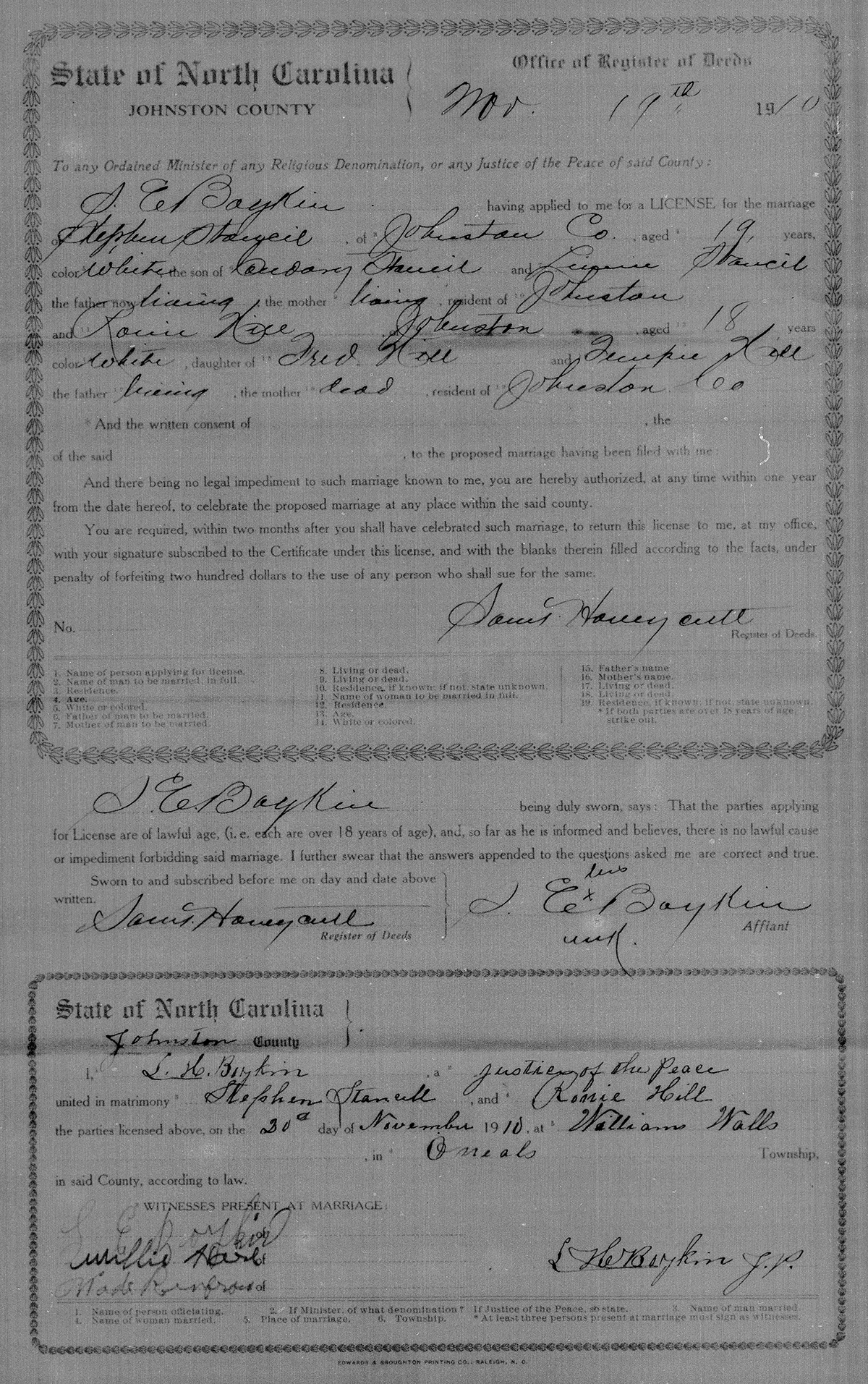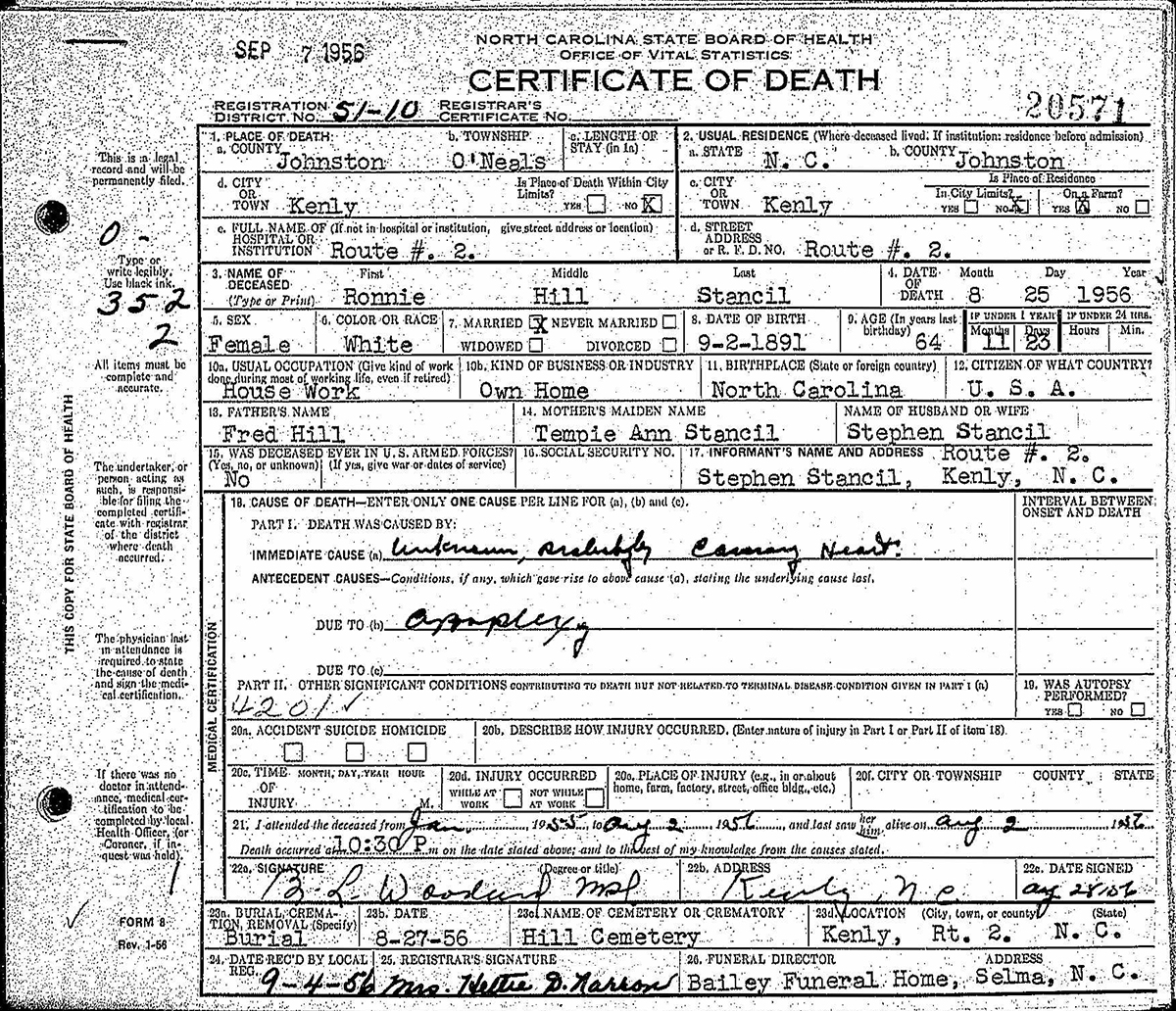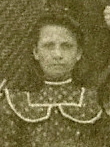Ronia Hill was born on September 2, 1891, in Kenly, Johnston County, North Carolina. She was the second child and second daughter of Fred and Tempy Ann Stancil Hill, just one year and one day younger than her older sister, Delia.
Her many siblings included John Fletcher Hill, Millard Lee Hill, William Moses Hill, Delphia Pearl Hill, James Clarence Hill, George Preston Hill, Edgar Resley Hill, Floyd "Jack" Jackson Hill, and Tonie Hill.
Ronia received her early education at the historical Slave House on the Boyette Homestead. Her childhood saw early loss, as her mother, Tempy Ann, passed away when Ronia was only nine.
Stephen H. Stancil was born on September 30, 1891, in Johnston County, the son of Condary and Selina Boykin Stancil. He was a farmer by profession, cultivating tobacco, corn, cotton, and sugar cane.
Stephen had brown eyes and black hair, which grayed early, and he attended school during his youth. He was also a Republican, and the family subscribed to the Smithfield Herald weekly newspaper.
Marriage and Family Life
Ronia Hill and Stephen H. Stancil were united in marriage on November 20, 1910, in O'Neals Township of Johnston County, with a Justice of the Peace officiating at William Walls' residence.
They built a home together, living for a time with Millard and Zilphia immediately after their wedding, a common practice for newlyweds in the family. They owned a Family Bible, in which Ronia carefully recorded the names of their children.
Their home life was characterized by Ronia's tireless dedication. She made biscuits three times a day and sewed clothes for her children, using her Singer treadle sewing machine, often utilizing pretty flour sacks for fabric. Ronia loved to read the Bible and knitted stockings for her children, which they would hang on Christmas Eve, eagerly awaiting fruit, nuts, and stick candy on Christmas morning. Ronia also famously made a special cake with gum balls for family reunions, a tradition that became a beloved highlight.
Stephen, a diligent farmer, worked his land with mules named Mollie (brown) and Gray (grey), which the children enjoyed riding. He drove a mule and buggy to town. Stephen was also known for making syrup for his neighbors, who would bring their sugar cane to his mill. His children loved eating the crystallized syrup, and the fifty gallons of syrup he produced each year would last all year. Stephen maintained a principled stance, not making whiskey or wine. During harvest seasons, two or three neighbors would work together to gather tobacco, with everyone returning to their own homes for lunch.
Their farm was a lively place with cows, hogs, chickens (which ran loose), and mules. Ronia kept cats in the house, even creating a special "cat hole" in the corner of the door for them. Stephen built the outhouse, a two-hole structure with a pit, and Ronia used a lantern for nighttime visits. The family regularly participated in traditional community events like hog killings in the fall, where Ronia would feed everyone, and barn raisings, for which Ronia would prepare the noon meal.
Ronia also engaged in the wider world; when women gained the right to vote in 1920, Ronia proudly registered as a Republican.
Later Years and Legacy
Ronia was often ill during her later years, experiencing a stroke at home and requiring hospitalization at Woodard Heron Hospital in Wilson. She passed away on August 25, 1956, in O'Neals Township, Johnston County, North Carolina. Her funeral was preached at home, and a coffin was purchased. She was first buried in Hill Cemetery, but her remains were later moved to New Jerusalem Church Cemetery in Kenly, North Carolina, where she rests today. A notable detail recalled by family was that Ronia had no gray hair at the time of her passing. Her sister, Eula, inherited Ronia's cherished Singer sewing machine.
Stephen continued to live in Johnston County, maintaining his farm and involvement in the community. He passed away from a stroke on March 1, 1971, in Kenly. His funeral was held at New Jerusalem Church, where he was laid to rest in the church cemetery, joining his beloved Ronia.
Ronia and Stephen's lives stand as a testament to the strength of family, the rhythms of farm life, and the values of hard work and community that defined their generation.
Documents & Related Media



